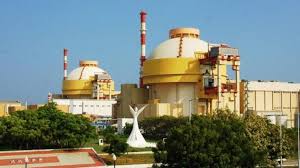Westinghouse to sign agreement with India’s Nuclear Power Corporation for supply of nuclear reactors
India’s Civil Liability for Nuclear Damage law that foreign governments and vendors say leaves open the possibility of lawsuits against suppliers for nuclear accidents, rather than the operators of the plants, has been a sticking point.

U.S. energy firm Westinghouse is expected to sign a new agreement with state-run Nuclear Power Corporation of India for the supply of six nuclear reactors during U.S. President Donald Trump’s visit next week, officials said, aiming to kickstart a long-running project, reported Reuters.
According to Reuters, the agreement will lay out timelines and the lead local constructor for the reactors to be built at Kovvada in southern India and also address lingering concerns over India’s nuclear liability law.
In 2008 India and the United States signed the landmark civil nuclear energy deal. The US has since been pushing India to buy nuclear reactors and last year the two sides agreed to the establishmennt of six reactors.
As India gears up for the first ever visit by US President Donald Trump and first lady Melania, representatives from U.S. energy and commerce departments, Westinghouse, the U.S.-India Strategic Partnership Forum and The Nuclear Energy Institute visited India last week to discuss with Indian officials the the sale of the reactors to India.
Reuters quoted Dr. Rita Baranwal assistant secretary for the Office of Nuclear Energy in the U.S. Department of Energy, as saying “We are encouraging moving forward with Westinghouse and NPCIL to sign a MoU. It certainly is a private industry to private industry, a business to business decision.”
“We’re optimistic that an MoU will be signed shortly,” Baranwal, who was part of the mission, was quoted as saying. Once that is cleared the two sides will begin contract negotiations, delivery schedules and pick vendors. The plan for a new MoU has not been previously reported.
Indian foreign ministry spokesman Raveesh Kumar said on Thursday Westinghouse and NPCIL were in talks to move forward with the project.
“Following resolution of Westinghouse’s bankruptcy issues, the two sides are in discussion regarding the division of responsibility of the work,” he said.
Trump has made bilateral trade with India a top priority, seeking greater market access for U.S. products from farm goods to motorcycles. Negotiators are trying to put together a limited trade deal before a bigger agreement that Trump said this week will probably happen after the U.S. presidential elections.
A longstanding obstacle has been the need to bring Indian liability rules in-line with international norms, which require the costs of any accident to be channelled to the operator rather than the maker of a nuclear power station.
Pittsburgh-based Westinghouse’s plans to supply the AP1000 reactors to India which it has also sold to China were thrown into further doubt when it filed for bankruptcy in 2017 after cost overruns on U.S. reactors.
Canada’s Brookfield Asset Management bought Westinghouse from Toshiba in August 2018 and has sought progress on the India sale over the next six-seven months, the member of the U.S. delegation said, speaking on condition of anonymity, reported Reuters.
India has made clear there is no going back on the 2010 Civil Liability for Nuclear Damage law that foreign governments and vendors say leaves open the possibility of lawsuits against suppliers for nuclear accidents, rather than the operators of the plants.
Prime Minister Narendra Modi’s government has tried to limit the impact of that law by setting up an insurance fund for potential victims of a nuclear accident.
“To be clear, there are still open issues around the liability issue,” Baranwal said, adding it was part of the discussions last week. “I can’t say that it’s been resolved. But we made some progress and understanding was that concerns were at a higher level.”
India expects to generate 22,480 MW of electricity from nuclear stations by 2031 up from the 2019 level of 6780 MW.
V.K. Saraswat, a top member of the government think-tank Niti Aayog said while solar was top priority, the government remained committed to nuclear energy also, as a clean source.